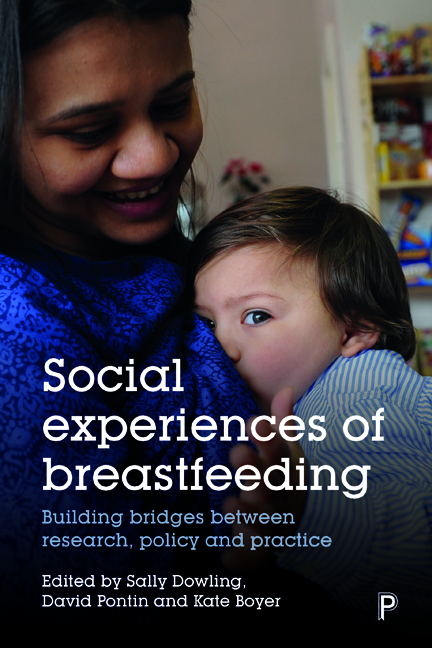Book contents
- Frontmatter
- Dedication
- Contents
- List of tables and figures
- Notes on contributors
- Acknowledgements
- Introduction
- The UK policy context: reconfiguration of the Unicef UK Baby Friendly Initiative to reflect the importance of relationships and ensuring sustainability
- Part I Breastfeeding and emotions
- Part II Cultures of breastfeeding
- Part III Breastfeeding and popular culture
- Conclusion
- Appendix: Schedule for ESRC Seminar Series: Social Experiences of Breastfeeding: Building bridges between research and policy, 2015–16
- Index
three - ‘Betwixt and between’: women’s experiences of breastfeeding long term
Published online by Cambridge University Press: 22 April 2022
- Frontmatter
- Dedication
- Contents
- List of tables and figures
- Notes on contributors
- Acknowledgements
- Introduction
- The UK policy context: reconfiguration of the Unicef UK Baby Friendly Initiative to reflect the importance of relationships and ensuring sustainability
- Part I Breastfeeding and emotions
- Part II Cultures of breastfeeding
- Part III Breastfeeding and popular culture
- Conclusion
- Appendix: Schedule for ESRC Seminar Series: Social Experiences of Breastfeeding: Building bridges between research and policy, 2015–16
- Index
Summary
Introduction
This chapter draws on my research with women who breastfeed for longer than is usual in the UK, where a minority of women are still breastfeeding at six months and an unknown number breastfeed into the second year of life and beyond (McAndrew et al, 2012). The anthropological concept of liminality (being ‘neither one thing nor another’) is used to explore and understand their experiences. The chapter takes ideas about liminality and relates them to breastfeeding long term, discussing how they might help those working in this area to support more mothers to breastfeed for longer. It briefly outlines what is known about long-term breastfeeding from previous research and explains the concept of liminality.
The remainder of the chapter discusses the findings in relation to liminality and how this has been used to think about breastfeeding, and considers what being ‘betwixt and between’ means for breastfeeding women. The idea of breastfeeding as polluting or ‘matter out of place’ (Douglas, 2002 [1966]) is also briefly discussed. The research project contributes to other publications (Dowling and Brown, 2013; Tomori et al, 2016; Dowling and Pontin, 2017) but this chapter focuses on how it might be used in breastfeeding support both in a wider, cultural sense, and by healthcare practitioners and volunteers.
Background
What do we know about long-term breastfeeding and health?
The focus in this chapter is on social and cultural experiences of breastfeeding long term, rather than physical health. The health consequences of not breastfeeding are well established, and there are known problems in carrying out research in this area: ethical difficulties with randomised controlled trials (RCTs) lead to a dependence on observational and cohort studies (Horta and Victora, 2013). Despite these difficulties, the evidence in relation to breastfeeding recommendations is stronger than ever (Victora et al, 2016). Carrying out research on long-term breastfeeding is particularly difficult, as sample sizes are small and older breastfeeders have many other influences on their health. However, there is a known dose–response relationship for many of the health consequences of having been breastfed; that is, the more breast milk a baby receives the greater the influence on health or protection against illness.
- Type
- Chapter
- Information
- Social Experiences of BreastfeedingBuilding Bridges between Research, Policy and Practice, pp. 55 - 70Publisher: Bristol University PressPrint publication year: 2018



